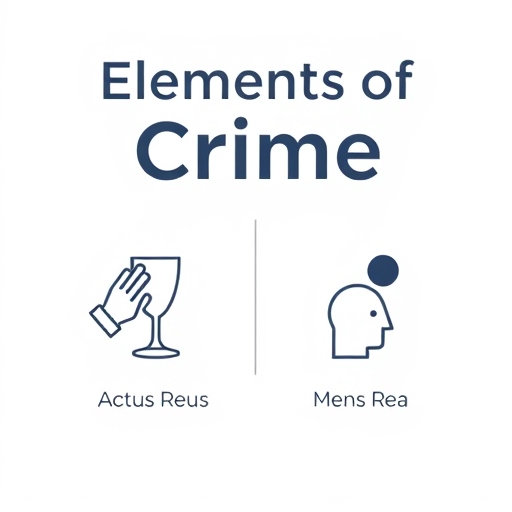Crime is a term that encompasses illegal act in which someone can be punished by the government. It is an act against the society/state.
An Example of Crime is a ‘Robber’. Robbery is that act when someone takes an item from another person by force. Since this act is unlawful, it is considered a crime with a subsequent legal punishment.
The word ‘Crime’ derives from the Latin word ‘Crimen’, Which means Accusation.
In modern sense, Crime is an any act that is obstructed by penal law, and that results in Punishment.It is harmful not only to some person or individuals but also to a community, society or the state. Hence, Crimes are unjustifiable and inexcusable Human conducts, Prohibited and punished by law.
Definition :
According to Blackstone : “A crime is an act committed or omitted in violation of a public law either forbidding or commanding it.” (Crime is a public wrong)
According to Stephen: “A crime is an act not only punishable by law but is also revolting to the moral sentiments of the society.” (Crime is a moral wrong)
No act is per se Criminal, It becomes Criminal only when the actor does it with a guilty mind. It is a Fundamental principle of Criminal law That ‘A’ person cannot be found guilty of a crime unless the prosecution proves, beyond a reasonable doubt, that the person both committed the prohibited act and had the necessary state of mind associated with the act.
It is well said in the Latin maxim, “Actus Non Facit Reum Nisi Mes Sit Rea.” Which means A person is not criminally liable for his conduct unless the prescribed state of mind coincides with the prohibited actus reus.
There are two elements of crime :

- Acuts Reus – Which denotes a guilty act ,and
- Mens Rea – Which denotes a guilty mind.
Without actus reus, there cannot be a crime:’No Actus Reus No Crime’ and without Mens Rea there cannot be a criminal liability. Hence, Any unlawful acts (Criminal offenses) require both elements to be considered a Crime.
*Case laws
GovVs Deepak Khatri, 2075
In this case, the court stated that to be a criminal offense there must be actus reus and mens rea, and the forms of means rea found in a particular act help determine the gravity of offence.
- Actus reus (Criminal Act)
Actus Reus is derived from two Latin term “actus” and “reus”. In Latin term “actus” Means ‘deed(act)’ and “reus” means ‘Forbidden’, ‘Prohibited’ or ‘Prevented’ by the law. Thus, In simple and literal meaning “actus reus” means the act or deed Forbidden by the law.
It is an act that is prohibited by law and it must be willed, Conscious, and Voluntary.
There are three Forms of actus Reus.
i. Commission (Voluntary Act):
A Voluntary act is a Conscious and deliberate action performed by the defendant that leads to the commission of a criminal offense. To establish actus reus, the prosecution must demonstrate that the defendant engaged in a voluntary act that resulted in a criminal outcome.
This is where the crime involves taking direct action. For example:
- Assaulting another person
- Stealing property
- Damaging Someone’s Belongings.
ii. Omission (Negative Act) :
An Omission refers to the failure to act when legally required, Resulting in criminal liability. Omission can be more challenging to establish as Actus reus, as it often depends on the specific circumstances and the defendant’s on the specifics circumstances and the defendant’s duty to act.
Generally, For an omission to be considered actus reus, the defendant must have:
- A legal duty to act,
- Knowledge of the facts necessitating action, and
- The ability to perform required action.
Some examples of omission that may constitute actus reus include;-
- Failing to provide food or care for a dependent person.
- Neglecting to report a serious crime when required by law.
iii. State of Affairs:
State of Affairs Crimes also known as strict liability offences involve situations where the defendant’s mere presence or status is enough to establish actus reus. In these cases, the prosecution does not need to prove any specific voluntary act or omission, as long as the defendant’s state of affairs is criminalized under the law.
For Example:
- Being present in a prohibited area.
- Possessing illegal drugs or firearms.
- Operating a business without proper licensing.
2. Mens Rea
A mere person will never commit a crime a crime unless he possesses some intention to commit it. The law generally refers to this intention as means rea, which is derived from latin term, wich means “guilty mind’.
The term Mens Rea has been derived from a famous Latin maxim: ‘Actus non facit reum nesi mens sit rea.’ This basically means that an act cannot be guilty if it does not accompany a guilty mind.
Means Rea is a mental fault or guilty mind that leads to cause Actus Reus. As the Actus Reus is legal ‘badness’, Means Rea is a ‘bad intention’ to cause it. Mens Rea is willingness and intention to commit crime. Mental elements are necessary for the commission of a crime.
Forms of Mens Rea
i. Intention:
Intention is the highest degree or level of culpability of Means Rea. It is the state of mind of one who aims or desires to bring about a particular consequences. It is a main form of Means Rea.
For Example: If some one plans and executes a murder, their intention is to cause the death of the victim.
Nepalese law on Offence Against Human Body, section 177 of the chapter on offence relating to human body of Muluki Penal code.2074 (2017 AD) mentioned about Intentions.
There are two types of intentions.
a. Direct Intention : Direct Intention is when someone does something which is a clear goal in mind. It’s like aiming for a target and hitting it on purpose.
For Example: If the person shoots the victim with the clear and specific purpose of causing their death, that’s direct intention. They aimed to kill the victim and they did so on purpose.
b. Oblique Intention : Oblique Intention is when someone does something with a different goal in mind, but they know that a certain result is likely to happen as a consequences of their actions. It’s like aiming for one target but hitting another one accidently.
For Example: If someone throws a heavy object off a bridge into a busy road below to cause a traffic jam. If the person knows that throwing the object could injure or kill someone, but they do it anyway to cause chaos on the road, and someone is indeed,hurt or killed by the falling object.
ii. Recklessness:
Recklessness is s form of Mens Rea that amounts to less than intention but more than negligence. It has normally been held to have a subjective meaning of being aware of arising from one’s actions but deciding nonetheless to constitute with one’s actions and take the risk.
For Example: Driving a car at high speeds through a residential area without regard for the safety of pedestrians.
The National Penal Code, 2074, mentions recklessness in Section 181, which states: “No person shall cause the death of another by a reckless act.” Similarly, Section 161 of the Motor Vehicle and Transportation Act, 2049 also deals with recklessness.
iii. Negligence:
Negligence Generally refers to carelessness. It means failure to do something that a reasonable man would do, or doing something that are reasonable man would not do. It refers to failing to take reasonable and justified risk. Negligence is directly related with duty to comply with a standard to conduct.
For Example: During Surgery, a Surgeon leaves a surgical instrument inside the patient’s body.
The National Penal Code, 2074, in Section 182, prohibits causing death by negligence. Similarly, Section 161(4) of the Motor Vehicle and Transportation Act, 2049, also pertains to negligence.
Reference:
- National Penal Code,2074
- Criminal Law: Principles & Practices by Subash Acharya
- https://www.ccwb.gov.np/uploads/Resource/Lawpolicies/Act/motor-vehicles-and-transport-management-act.pdf
- Criminal Law By David C. Brody, James R. Acker




